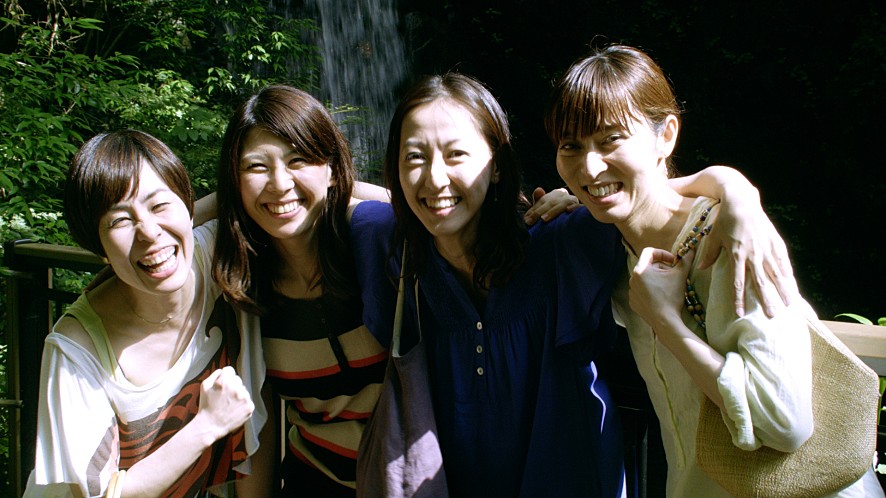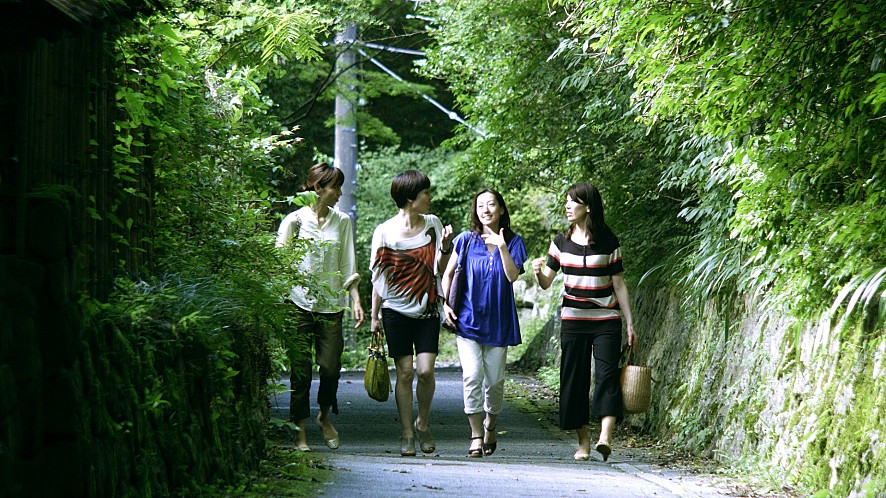Ryūsuke Hamaguchi’s “Happy Hour” is a challenging but ultimately rewarding experience you should give a chance someday. The movie will surely daunt you for its very long running time which is more than 5 hours (!), but it will gradually hold your attention thanks to the skillful handling of mood, story, and characters, and there are a number of wonderful moments to be savored and appreciated.
At the beginning, the movie, which is set in a Japanese city named Kobe, introduces us to four different women who have been close friends for more than 20 years. They are Akari (Sachie Tanaka), Sakurako (Hazuki Kikuchi), Fumi (Maiko Mihara), and Jun (Rira Kawamura), and the opening scene shows them having a little private picnic together at a local park around the city. As the movie calmly focuses on their plain conversation later, we come to sense more of how long they have known each other, and we become more immersed in the cheerful mood of their conversation as they talk about one thing after another for a while.
After this first long sequence in the film, we get to know more about their respective private lives. Unlike her three friends, Akari has been a single woman since her recent divorce, but she does not care much about being alone as mostly occupied with her busy daily work. She works as a nurse at some local hospital, and we come to discern that one of the doctors in the hospital is apparently interested in getting closer to her, but she pays more attention to a young nurse who really needs more lesson and experience for doing her jobs better.
On the surface, Sakurako has the most stable domestic life in the bunch, but it does not take much time for us to discern how much she has been suffocated by her domestic role. While her husband is usually absent due to his busy job, she is supposed to take care of all those domestic matters for herself, and she certainly feels more pressured when her mother-in-law happens to stay in her residence for an indeterminate period. In addition, her adolescent son turns out to have a little private matter behind his back, and we are not so surprised when that matter of his leads to something quite serious later in the film.
In case of Fumi, she and her husband have maintained an acceptable equilibrium between work and private life, but she cannot help but feel frustrated with how they have been more like roommates rather than a married couple, and that drives her more to her work. While her husband works as the editor of a notable female writer, she usually handles small cultural events, and she later gets her three friends to join a little private workshop along with her at one point.
The workshop is presented by a guy who has some interesting artistic skills and life philosophy, and the movie willingly spends a very long time with his workshop process. I must confess that I initially observed this guy with some skepticism, but then I found myself intrigued and amused by what he and others try to do for, supposedly, real human communication, and then this intriguing sequence is followed by another long conversation sequence as our four ladies and several other characters come to have a post-workshop meeting.
Their conversation initially feels casual and cheerful, but then there comes a sudden awkward moment when Jun comes to reveal that she has been trying to divorce her husband because she feels no love from him. While certainly caught off guard by how their friend has hided that from them, Jun’s friends decide to stand by her as usual, and we get another long sequence where Jun has to go through a rather grueling process at the court while her friends are there for giving her some support.
The mood becomes more pleasant when our four ladies subsequently go to a hot spring town outside Kobe, but then the movie goes for more plot conflict and development after a small but crucial narrative turn. As seeing how much Jun has been unhappy and miserable, her friends respectively come to reflect more on whether they have been really happy, and their growing doubt and anxiety naturally lead to several key moments to observe as each of them comes to make each own choice for their respective lives in one way or another.
Dexterously juggling its four different main characters from the beginning to the end, the movie also pays some attention to a number of supporting characters around them, who also contribute much to its rich overall experience. We are amused by the possibly romantic interaction between Akari and a certain supporting character, and then we are chilled and repulsed by how coldly articulately Jun’s husband describes his nearly loveless fixation on his wife. We are touched by how Sakurako’s mother-in-law turns out to be more supportive than expected, and we are intrigued by whatever is developing between Fumi’s husband and that young female writer, who later has a showstopper moment when she reads her latest work in front of several other characters and many other audiences.
To be frank with you, I was surprised to learn later that the four lead actresses of the film actually did not have any movie acting experience before selected by the director via a local workshop. I have no idea on how much they prepared before shooting many long sequences in the film, but the four lead actresses of the movie all look natural and effortless in their interactions on the screen, and that says a lot about Hamaguchi’s considerable filmmaking skill and talent.
Overall, “Happy Hour”, which is the longest Japanese feature film according to the IMDB trivia, surely demands some patience from you right from the beginning, but then it will interest and engage you a lot via its genuine human moments to be appreciated, and you will come to root for its four ladies a lot around the end of their emotional journey. It is quite long indeed, but its commendable achievement in terms of story and characters takes me back to what my mentor/friend Roger Ebert once said: “No good movie is too long, and no bad movie is short enough.”










